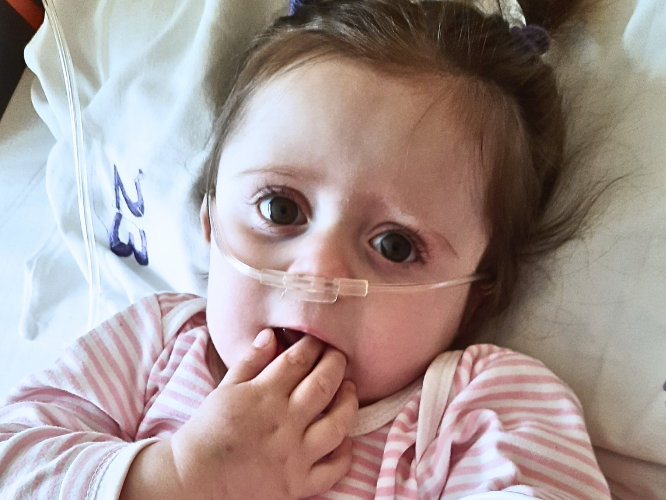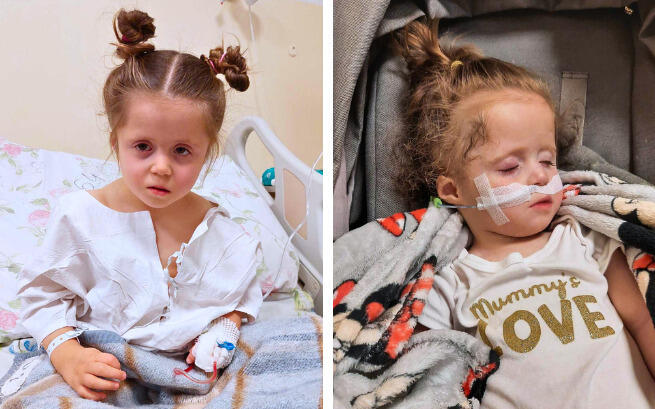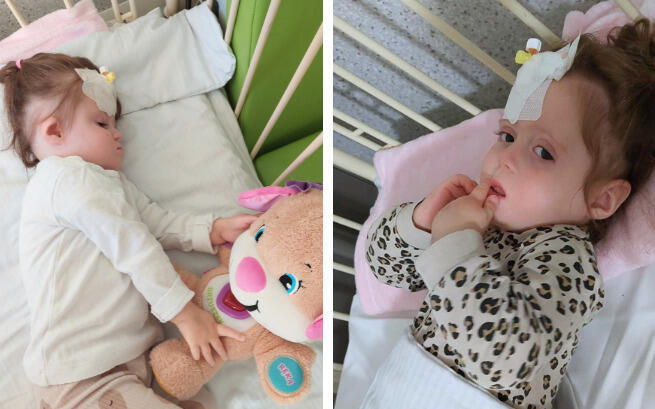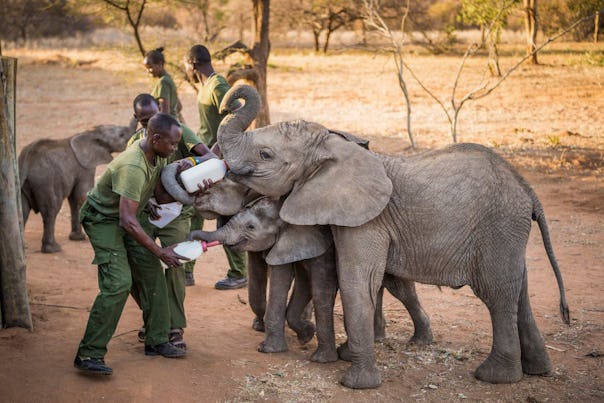Oliwka's Unwavering Fight: A Journey Through Life's Toughest Battles
Oliwka is almost 4 years old and has already defeated death twice.
She entered this world with severe birth asphyxia, scoring just 2 on the Apgar scale. From the very beginning, we knew her journey would be anything but ordinary. The first days, weeks, and months of her life were filled with hospital visits, specialists, and endless therapy sessions. As new parents, we faced unimaginable challenges, but we held onto the belief that our daughter could overcome them.
The first five months of Oliwka’s life were relatively quiet compared to what was to come. We went through the motions of regular doctor visits and therapy, hoping and praying that things would improve. But nothing could prepare us for the moment when everything changed.

One weekend in May, Oliwka suffered her first seizure. In an instant, our world was turned upside down. Her tiny body convulsed, draining the life out of her. She stopped smiling. She stopped moving her eyes. She stopped babbling. Every skill she had acquired in the first months of her life seemed to vanish before our eyes. The seizures became relentless, occurring dozens of times a day. We rushed to the University Clinical Center in Gdańsk, where we were met by a team of specialists who did everything they could to stop the seizures, but it wasn’t enough. The seizures continued, and with them, more and more questions arose.
After numerous tests, we finally received the devastating diagnosis: Oliwka has 1p36 deletion syndrome. It’s a rare genetic disorder with no cure. Along with the diagnosis came a list of challenges no parent should ever hear: a heart defect, a spinal defect, kidney stones, a neurogenic bladder, epilepsy, vision impairment, and hearing impairment. The news felt like a death sentence for the future we had dreamed of for our daughter.
Oliwka can't walk, talk, or eat on her own. She is fed through a PEG tube, a constant reminder of how fragile her life truly is. The deletion also causes severe intellectual and motor disabilities. We were told that Oliwka may never speak again, and those words echoed in our hearts with a painful reality that we were still trying to process.

Despite all of this, we refuse to give up on our daughter. Her fight is our fight. Every day, we do everything in our power to give her the care and therapy she needs. There is no cure, but we know that with the right therapies, medications, and equipment, she can continue to grow stronger.
The cost of therapy, rehabilitation sessions, medications, and medical equipment is overwhelming—around 30,000 złoty per year. For the past four years, we’ve managed to pay for most of her treatments and equipment ourselves, doing everything we could to give her the best chance at life. But we’ve now reached a point where we can no longer do it alone. The financial burden is too great, and we are humbly asking for help.
With your support, Oliwka can continue fighting this cruel disease. We will have peace of mind knowing that we can provide her with the therapies, equipment, and medications that are essential to her survival and development. Each donation, no matter how small, will make a huge difference in her ability to continue fighting for her life and reaching her fullest potential.

We are eternally grateful for the support we’ve received so far. Your kindness and generosity have helped us through some of the darkest days of our journey. Oliwka’s strength and determination inspire us every day, and we know that with your help, she can continue to fight.
Thank you from the bottom of our hearts for supporting our little warrior. Together, we can help Oliwka live a life that, though filled with challenges, will be full of love, hope, and the possibility of progress. Please help us give our daughter the chance she deserves to survive and thrive.
A Miracle in Northern Kenya: How Goat Milk Is Saving Baby Elephants — and Transforming Lives

In the rugged, sun-scorched hills of northern Kenya, where acacia trees stretch toward a sky painted in dust and gold, something extraordinary is unfolding. It isn’t loud or flashy — no grand announcement, no camera crews. It’s quiet, tender, and profoundly human. At the
For years, the caregivers at Reteti faced a heartbreaking challenge. When baby elephants lose their mothers — often to poaching, drought, or human-wildlife conflict — they also lose their only source of nutrition. Elephant calves are delicate; their digestive systems are sensitive, and they rely on their mother’s milk for survival during the first two years of life. Without it, their chances of survival plummet.
The sanctuary had long depended on imported baby formula from overseas. It was expensive, sometimes inconsistent, and often delayed by shipping and supply issues. Each tin cost more than most local families earned in a week. “It wasn’t sustainable,” recalls

That “something” turned out to be right next door, grazing on the rocky slopes of Samburu land.
Goats.
Local herders had always known that goat milk was rich, nourishing, and easy to digest. What no one realized was that it might also hold the key to saving orphaned elephants. After careful testing and gradual introduction, the results were astonishing. The calves began to thrive. Their energy returned. Their small, uncertain trumpets grew louder, stronger, full of life once more.
“It’s natural, nutritious, and working wonders,” says Dr. Chege, his eyes lighting up with pride. “We’ve seen calves regain strength in days. Their growth is better. Their health is better. It’s as if nature gave us the answer right here, in our own backyard.”
But the miracle didn’t end with the elephants.

As demand for goat milk grew, so did opportunity — especially for local women like Liwana Lenakukunyia, who had spent years struggling to earn a steady income in a region where work is scarce and droughts unforgiving. Today, Liwana is one of the sanctuary’s trusted milk suppliers. Every morning, she milks her goats under the first light of dawn, pours the fresh milk into metal containers, and delivers it to the sanctuary gates.
“The elephants help us — and we help them,” she says, her smile warm and proud. “Before, I had no job. Now I can feed my children, pay school fees, and see our community grow. We are part of something bigger than ourselves.”
That’s the beauty of Reteti’s story — it’s not just about saving elephants. It’s about rewriting the relationship between people and wildlife, about showing that conservation doesn’t have to be charity; it can be partnership.

In the Samburu language, there’s a word that captures this harmony — nkanyit, meaning respect and unity. At Reteti, nkanyit isn’t just a word; it’s a way of life. The sanctuary is Kenya’s first community-owned elephant rescue center, built and run entirely by local people. Every keeper, every caretaker, every woman delivering milk — they’re all part of a shared mission: to heal what’s been broken and to protect the future they all depend on.
As the sun sets each evening, the sanctuary comes alive with gentle ritual. Keepers gather beside large bottles of warm goat milk. The orphaned calves — with names like Nadasoit, Shaba, and Lodoket — line up eagerly, their trunks curling toward the bottles in excitement. The air fills with soft rumbles and the rhythmic sound of slurping trunks — a symphony of survival.
For the keepers, these moments are deeply emotional. Many of them were once herders who saw elephants as competition for scarce water and grazing land. Now, they see them as family. “When an elephant calf wraps its trunk around your arm, it feels like trust,” says Joseph Lemayan, one of Reteti’s longtime caregivers. “They remember who cares for them. And we remember that they depend on us.”
This bond has reshaped how the entire community views conservation. Instead of seeing wildlife as an obstacle, they now see it as a source of pride and livelihood. Goat milk isn’t just feeding elephants — it’s feeding coexistence.
What began as a desperate search for an affordable milk substitute has blossomed into a model of sustainability. The sanctuary now supports dozens of local women through milk collection programs, providing economic stability and empowerment in one of Kenya’s most remote regions. The elephants, in turn, are growing healthier, stronger, and more resilient.
It’s a circle of care that connects mothers to mothers — human and elephant alike.
“Every drop of milk tells a story,” says Liwana. “It’s the story of women, of animals, of this land. We are all part of it.”
The success of Reteti’s goat milk program has begun to inspire other wildlife sanctuaries across Africa to explore similar local solutions — proof that big problems don’t always need complex answers. Sometimes, they just need compassion, creativity, and trust in the wisdom of the land itself.
As night falls and the stars scatter across the Samburu sky, the sanctuary grows quiet again. The calves curl up beside one another, full and content, their breathing steady and calm. Outside their enclosure, Liwana walks home with an empty pail and a full heart, knowing that tomorrow, she’ll be part of this miracle once more.
And in the stillness, the message is clear: sometimes the most powerful changes begin not with grand gestures, but with a single act of care — a shared belief that life, in all its forms, is worth nurturing.
In northern Kenya, that belief is alive and thriving — one bottle of goat milk, one slurp of an elephant trunk, one heartbeat at a time.





